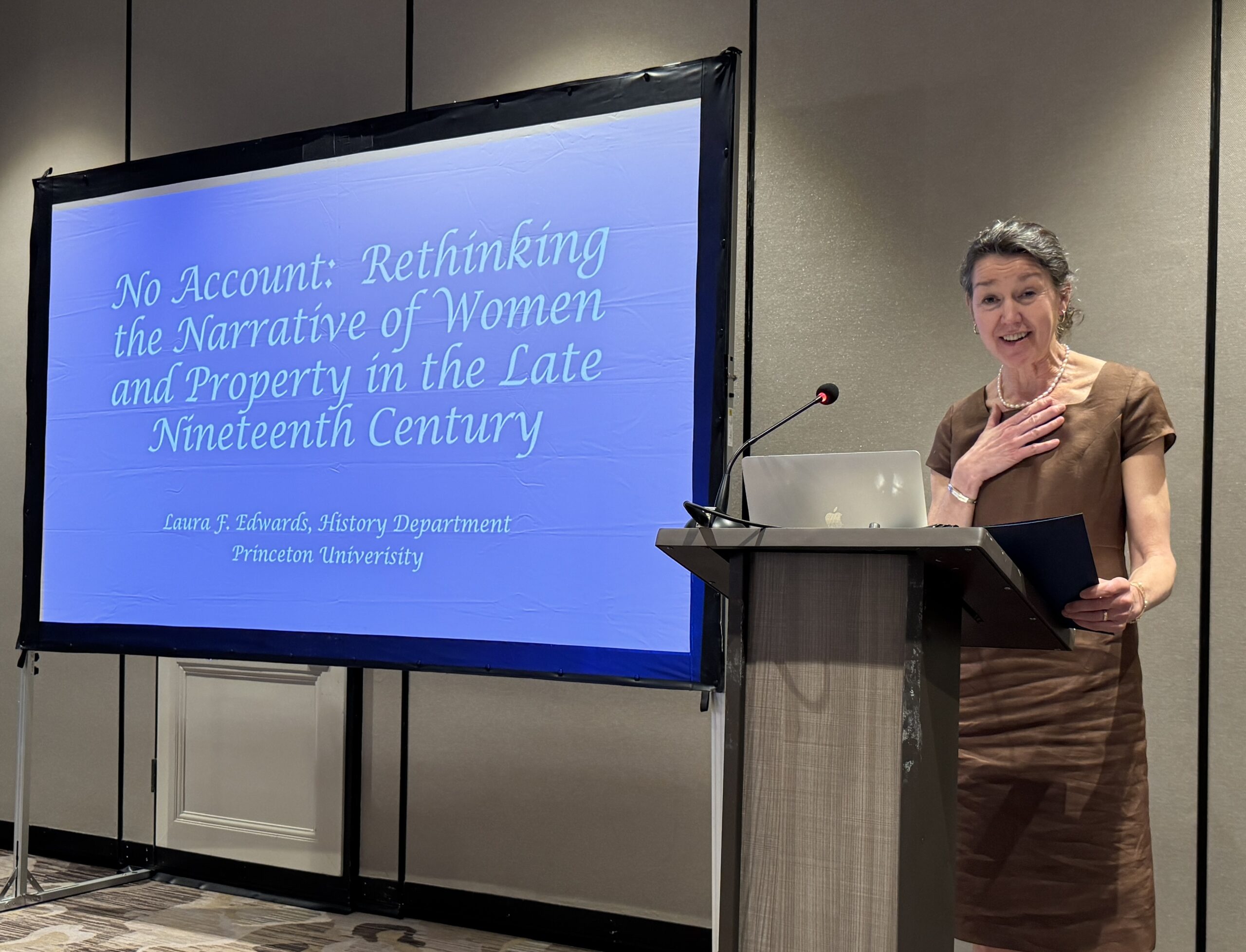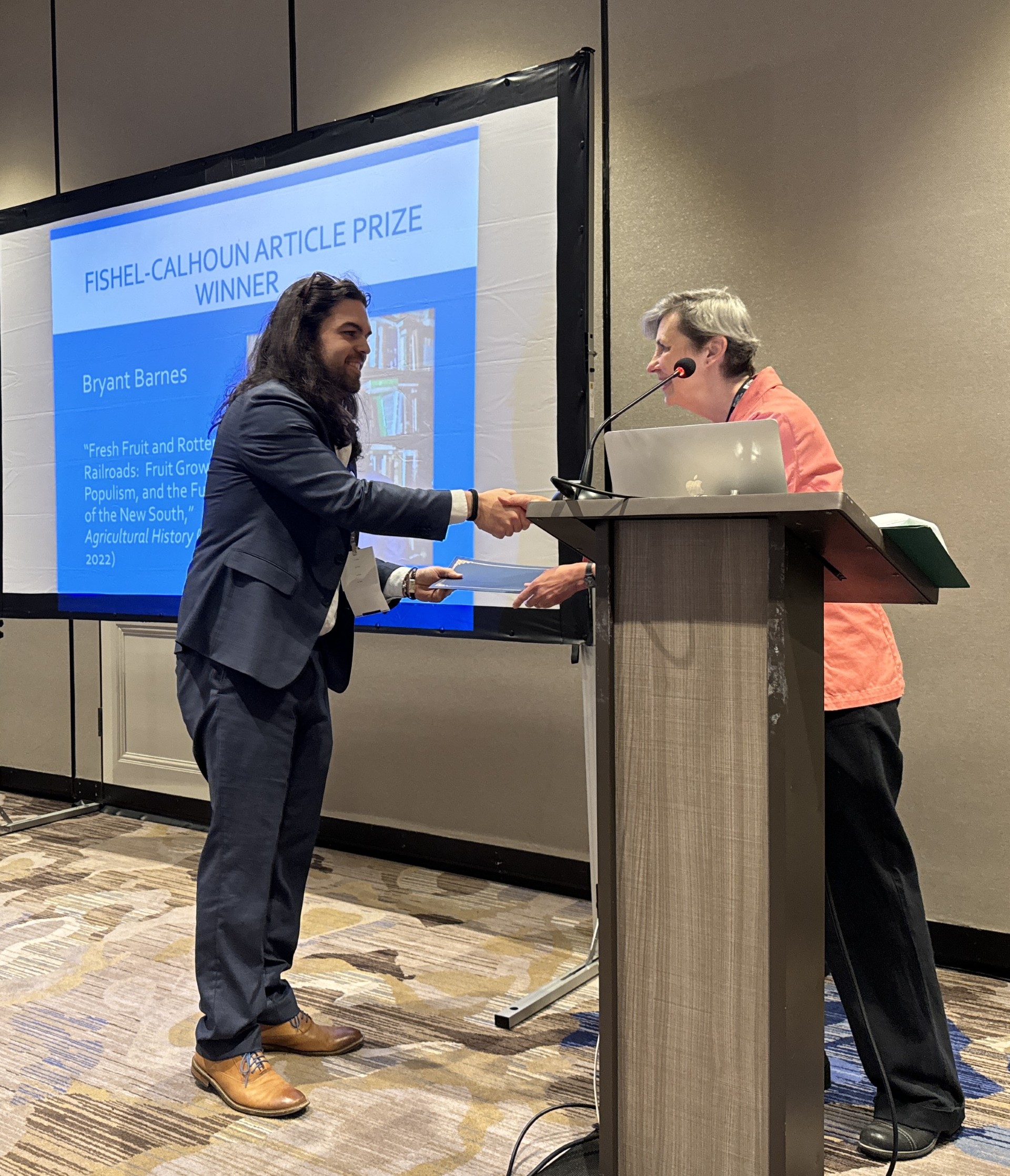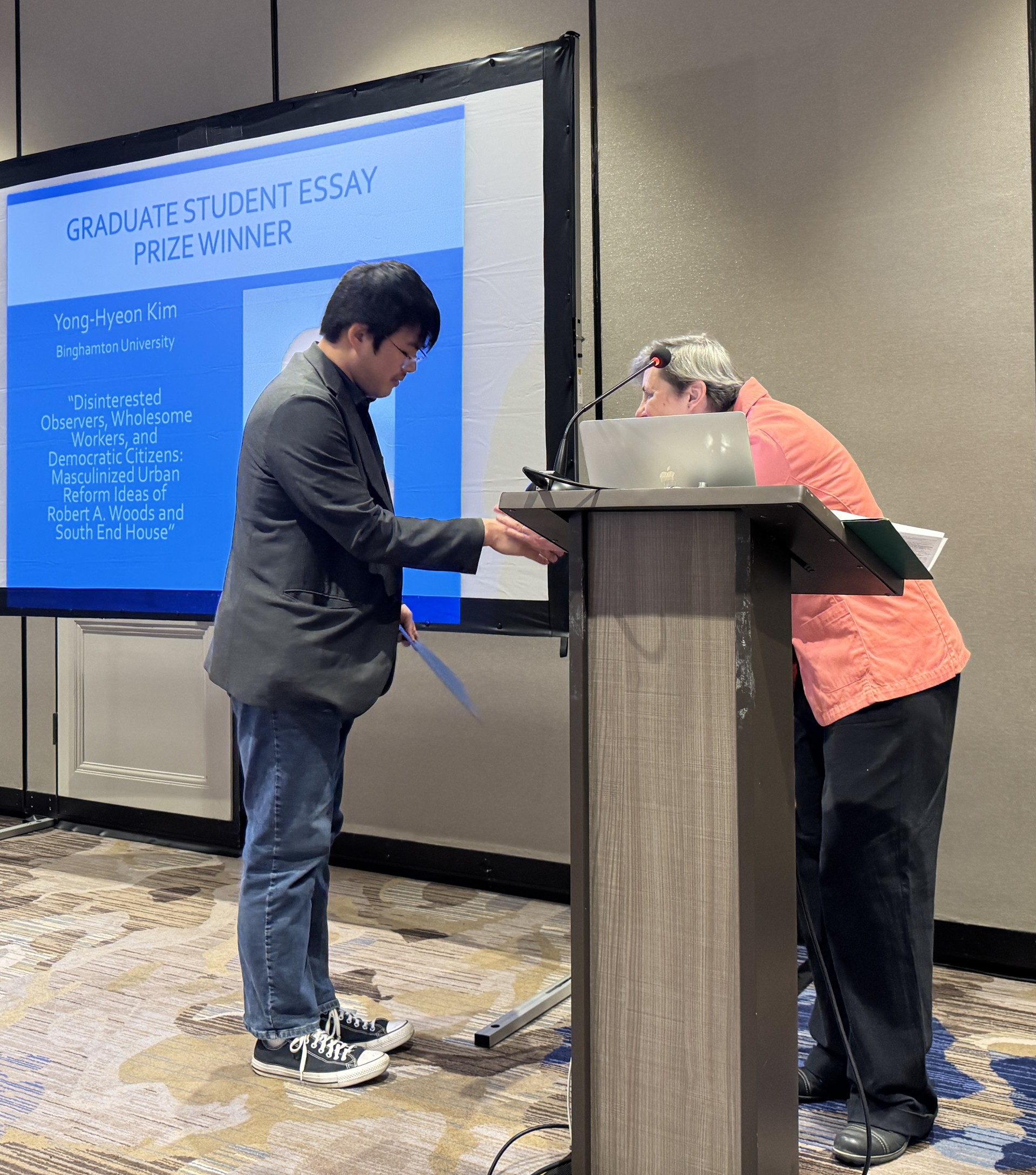April 23, 2024
The Society for Historians of the Gilded Age and Progressive Era is pleased to announce our 2024 prize and grant winners, recently celebrated at our annual SHGAPE luncheon at OAH. Congratulations to all our winners!
Distinguished Historian of the Gilded Age and Progressive Era
SHGAPE was delighted to host Laura F. Edwards (Princeton University), who gave the Distinguished Historian Address at our OAH luncheon. The title of her talk was “No Account: Rethinking the Narrative of Women and Property in the Late Nineteenth Century.”

Roger D. Bridges Distinguished Service Award
We are delighted to honor Amy Louise Wood (Illinois State University) with the Roger D. Bridges Distinguished Service Award for her superb service during her two terms as SHGAPE’s Executive Secretary (2014-2024).
The Presidents’ Book Prize
The Presidents’ Book Prize is awarded for the best book treating any aspect of United States history in the period between 1865 and the 1920s. The 2024 winner is Michael Willrich (Brandeis University) for American Anarchy: The Epic Struggle between Immigrant Radicals and the U.S. Government at the Dawn of the Twentieth Century (Basic Books, 2023). Willrich’s book offers a new and highly readable account of anarchism in the Gilded Age and Progressive Era. This, in and of itself, makes the work a welcome addition to the literature. However, Willrich’s deeply researched study does far more than this. Willrich painstakingly recreates the federal government’s unprecedented campaign of violent repression against anarchists. As significant, he convincingly argues that anarchism’s legal defenders helped to create the infrastructure of free speech jurisprudence in the United States. Beautifully written and displaying a keen eye for period detail, Willrich’s work will become the standard text on the anarchist movement in the United States, as well as required reading for all scholars of the Gilded Age and Progressive Era.
Honorable Mention goes to The Market in Birds: Commercial Hunting, Conservation, and the Origins of Wildlife Consumerism, 1850-1920 (Johns Hopkins University Press, 2022), by Andrea L. Smalley (Northern Illinois University) with Henry M. Reeves. The book began as a labor of love for Henry “Milt” Reeves, a federal game agent for the US Fish and Wildlife Service. After Reeves’s death in 2013, his family contacted historian Andrea Smalley, who used Reeves’s manuscript and research as the basis for a broad-ranging and beautifully written study of market hunting in the late 19th and early 20th century United States. The book traces the rise and fall of commercial bird hunting, offering chapters on game hunters, the market, hunted birds, sports hunters, poachers, and conservationists. In so doing, it connects environmental history to the history of capitalism, telling a powerful story about nature, the market, and consumerism in the Gilded Age and Progressive Era.
Fishel-Calhoun Article Prize
The Fishel-Calhoun Prize is awarded for the best article dealing with any aspect of United States history between 1865 and 1917 by a new scholar. This year’s winner is Bryant Barnes (University of Georgia) for “Fresh Fruit and Rotten Railroads: Fruit Growers, Populism, and the Future of the New South,” published in the May 2022 issue of Agricultural History. In this meticulously researched article, Barnes lays out the agricultural, economic, and political challenges of peach and truck farmers in Georgia. Focusing on the growers’ fight against railroad freight rates, the article demonstrates how this group of Populist farmers aspired to reach new markets and expand the Southern economy. Although their efforts attracted the interest of northern capital and seemed of a piece with New South boosters, Georgia growers consistently found that corporate capitalism produced inefficiency and economic precarity, prompting them to embrace Populist reforms. Barnes thus underscores the hostility of Populists to a rising corporate order but locates that hostility in hopes for new agricultural practices rather than a defense of timeless tradition.

Honorable Mention goes to Elizabeth D. Katz (University of Florida) for “Sex, Suffrage, and State Constitutional Law: Women’s Legal Right to Hold Public Office,” Yale Journal of Law and Feminism (2022). Katz uses state constitutions, court cases, newspaper reportage, and suffrage activists’ papers to excavate a rich history of women holding office before the ratification of the Nineteenth Amendment. Building on suffrage scholarship that called on scholars to examine the nuances of regional difference and to de-center 1920, she offers a deeply researched account of women’s office holding before they won the right to vote. In examining the assumption that office holding and voting rights were coupled and that women’s office holding followed the winning of suffrage rights, she has found that in many cases office holding preceded voting rights. Moreover, the example of women serving in office then became a tool that suffragists used to demonstrate women’s fitness for the vote. Her findings encourage deeper engagement with women’s path to office-holding and political representation.
Journal of the Gilded Age and Progressive Era Best Article Prize
Mazie Hough (University of Maine) is the winner of the 2024 JGAPE Best Article Prize for “‘There is Nothing So Sacred as Human Life:’ Infanticide and the State of Maine, 1877-1917.” Hough explores how during a national surge in infanticide in the late nineteenth century, the state of Maine proved to be an anomaly and dispensed much harsher sentences to women convicted of the crime of murdering their infants than other states. Relying on a diverse array of sources including newspapers, court records, attorney general reports, and community pardon petitions, Hough makes the case that we must look carefully at the relationship between the tradition of mutuality in rural communities and these local places’ relationship to state power to understand why these cases gained so much attention in the press. She concludes this moment marked a shift from rural women’s expected role in policing and managing women’s reproductive lives to the modern consolidation of state power and a professionalized criminal justice system in which attorney generals wielded tremendous authority. While community sentiment and customary participation did not wane, the state successfully gained control and systematically undermined rural women’s networks. Hough convincingly argues that gender and locality are central to understanding this change. A sophisticated multi-layered analysis, impressive command of historiography, deep extensive research, and its commanding prose distinguish this fascinating article.
The Graduate Student Essay Prize
This year’s winner of the Graduate Student Essay Prize is Yong-Hyeon Kim (Binghamton University) for “Disinterested Observers, Wholesome Workers, and Democratic Citizens: Masculinized Urban Reform Ideas of Robert A. Woods and South End House.” This essay was well-argued and sourced, compelling and layered, and a pleasure to read. Yong-Hyeon Kim offers a creative use of gender analysis on the well-trod topic of settlement houses. In a study comparing Hull House and South End House (a comparison that has been made before), the author freshly argues that contemporaneous views of masculinity—not just femininity—influenced the settlement house movement and the interests of its proponents during the Progressive Era. The essay offers a fresh lens on a topic we think we know.

SHGAPE Research Grant
The recipient of SHGAPE’s research grant is Mark Lewis Reynolds (University of California, Riverside) for his project, “The American Roots of War: US Empire Building and the First World War.” Reynolds examines “the understudied role of US empire-building in the genealogy of the First World War,” arguing that American imperialism “played a much more significant role in destabilizing transatlantic and transimperial relations than has previously been understood.” With this grant, Mr. Reynolds plans to conduct research at the Library of Congress which holds the papers of William Lindsay Scruggs, the man fired from his post as US Ambassador to Venezuela in 1892 on account of corruption only to be invited back by the Venezuelan government two years later to enlist the help of the US in Venezuela’s border dispute with British Guyana. Reynolds contends that a shortcoming of existing scholarship on US imperialism is that it focuses too heavily on presidents and well-known statesmen when it was often men like Scruggs who shaped the US approach to empire on the ground and in daily contact with their international counterparts. His work promises to contribute to multiple sub-fields of Gilded Age and Progressive Era History including foreign affairs and environmental history.
SHGAPE OAH Conference Travel Grant
This year’s recipient of the conference travel grant is Jessica Sue Cole (Oregon State University). Ms. Cole presented her paper, “Memorializing the Forgotten: Redressing the Erased Legacy of Asylum Patients in Historical U.S. Cemeteries,” at the OAH.
SHGAPE OAH Conference Travel Award for Ph.D. Students
Halee Robinson (Princeton University) received the conference travel award for Ph.D. students. Ms. Robinson presented her paper, “’Your wife until death’: The Intimate Histories of Incarcerated People and their Families in Late Nineteenth and Early Twentieth Century Texas,” at the OAH.
Prize winners are announced and celebrated at our annual SHGAPE luncheon at OAH. We hope you can join us next year! For a full list of SHGAPE prizes and deadlines, please visit our website. To volunteer to serve on a prize committee, please email SHGAPE Executive Secretary Kimberly Hamlin, hamlinka@miamioh.edu.
Cover image courtesy Kimberly Hamlin. Other photos courtesy Stacy Cordery.
Laura Crossley is Co-Editor-in-Chief of the SHGAPE Blog. She is a history PhD candidate at George Mason University, specializing in digital history and Indigenous histories. Her dissertation examines how political debates over land, statehood, and Native sovereignty in the American West played out at the 1904 Louisiana Purchase Exposition.